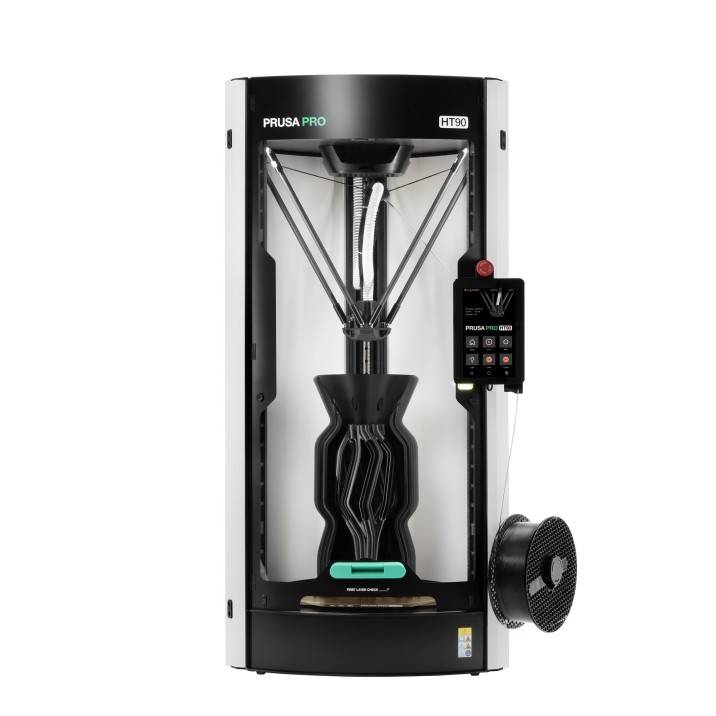At the Rapid TCT fair in Los Angeles, the company founded by Czech developer, entrepreneur, and investor Josef Průša announced the start of production of their new Prusa Pro HT90 3D printer. This marks a definitive move by Prusa Research into the industrial 3D printing market. Prusa Research aims to replicate its success in the desktop 3D printer segment, where the Original Prusa printers gained worldwide popularity among hobbyists and companies.
Prusa Pro HT90 has already generated buzz thanks to its support for high-end materials, which common desktop 3D printers cannot process, and its all-around performance. “If you have a development or prototyping department in your company, the HT90 is the only 3D printer your engineers will need,” says Josef Průša, CEO of Prusa Research. “It covers the entire production process, from rapid PLA prototyping to final products made from high-tech polymers. You don’t have to use multiple specialized printers or wait for your suppliers.” The HT90 offers everything necessary to make it the most affordable solution for comprehensive industrial 3D printing in areas such as aerospace, automotive, medical, manufacturing, and many others.
Working of Prusa Pro HT90
The printer uses delta kinematics, and in addition to its versatility, it also boasts high speed, outstanding print quality, unlimited third-party material compatibility (no vendor lock), and user data security. “In the industrial secretary, a printer with a fully-featured offline mode is often more valued than an always-online device with a mobile app that keeps sending data to third-party servers,” explains Vojtěch Tambor, head of the Prusa Pro Delta division, which developed the HT90. The printer offers three running modes: offline, local, and fully online. In the online mode, the printer is fully integrated into the secure Prusa Connect remote print management system. “Prusa Research never collects data without your consent – not the print data, not the printer’s surroundings. We believe that no organization except yours should be interested in this information,” adds Tambor.
The HT90 printer utilizes delta kinematics for its operation. It excels in terms of versatility, speed, print quality, and compatibility with third-party materials. What sets it apart is its offline mode, a highly appreciated feature in industrial settings where data security is paramount. According to Vojtěch Tambor, the head of the Prusa Pro Delta division responsible for developing the HT90, an always-online device with a mobile app doesn’t hold as much value as a printer with a fully-featured offline mode. The HT90 offers three operation modes: offline, local, and fully online. When in online mode, the printer seamlessly integrates with the secure Prusa Connect remote print management system. Tambor emphasizes that Prusa Research prioritizes user privacy and does not collect any data without explicit consent, including print data and information about the printer’s environment.
The HT90 has already been beta-tested by selected companies and is actively used in production. “The main advantage of this printer is that it was made to industrial standards. I can place it on my desk, or in the workshop, and I’m always confident that it will deliver the prints exactly the way I want them made,” says Herbert Kretzmer from Volkswagen Academy in Emden, Germany. Volkswagen is one of the companies that already actively use the HT90.
The HT90 is developed and manufactured by Prusa Pro, an independent division of Prusa Research focused on industrial applications. The development and production of printers is carried out separately from the teams at Prusa Research who continue to work on desktop 3D printers. “Expanding our portfolio with the Prusa Pro line certainly doesn’t mean that we are stepping away from our Original Prusa 3D printers, which customers have known and loved for more than 10 years,” explains Josef Průša. “On the contrary: with the Prusa Pro products, we can incorporate a vast range of cutting-edge technologies and their development also helps us advance our entire lineup of 3D printers.”
Company Press Release


